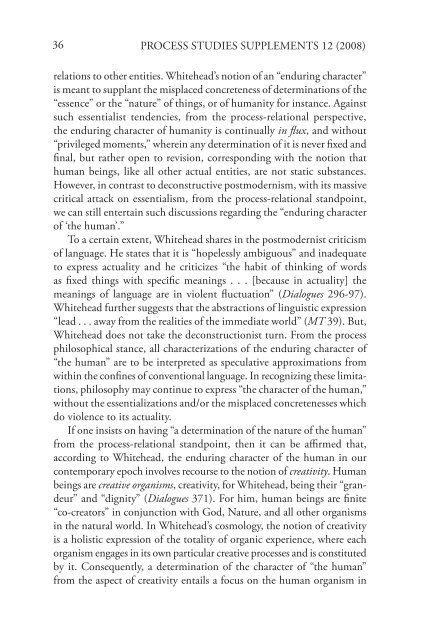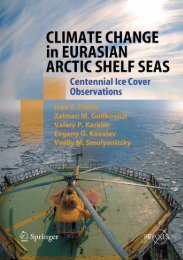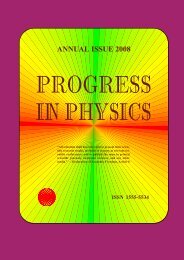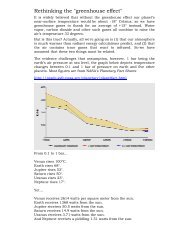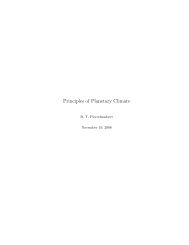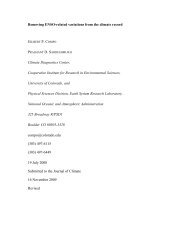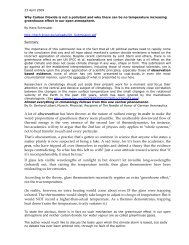Process Studies Supplement Overcoming Anthropocentric ... - Here
Process Studies Supplement Overcoming Anthropocentric ... - Here
Process Studies Supplement Overcoming Anthropocentric ... - Here
Create successful ePaper yourself
Turn your PDF publications into a flip-book with our unique Google optimized e-Paper software.
36<br />
PROCESS STUDIES SUPPLEMENTS 12 (2008)<br />
relations to other entities. Whitehead’s notion of an “enduring character”<br />
is meant to supplant the misplaced concreteness of determinations of the<br />
“essence” or the “nature” of things, or of humanity for instance. Against<br />
such essentialist tendencies, from the process-relational perspective,<br />
the enduring character of humanity is continually in flux, and without<br />
“privileged moments,” wherein any determination of it is never fixed and<br />
final, but rather open to revision, corresponding with the notion that<br />
human beings, like all other actual entities, are not static substances.<br />
However, in contrast to deconstructive postmodernism, with its massive<br />
critical attack on essentialism, from the process-relational standpoint,<br />
we can still entertain such discussions regarding the “enduring character<br />
of ‘the human’.”<br />
To a certain extent, Whitehead shares in the postmodernist criticism<br />
of language. He states that it is “hopelessly ambiguous” and inadequate<br />
to express actuality and he criticizes “the habit of thinking of words<br />
as fixed things with specific meanings . . . [because in actuality] the<br />
meanings of language are in violent fluctuation” (Dialogues 296-97).<br />
Whitehead further suggests that the abstractions of linguistic expression<br />
“lead . . . away from the realities of the immediate world” (MT 39). But,<br />
Whitehead does not take the deconstructionist turn. From the process<br />
philosophical stance, all characterizations of the enduring character of<br />
“the human” are to be interpreted as speculative approximations from<br />
within the confines of conventional language. In recognizing these limitations,<br />
philosophy may continue to express “the character of the human,”<br />
without the essentializations and/or the misplaced concretenesses which<br />
do violence to its actuality.<br />
If one insists on having “a determination of the nature of the human”<br />
from the process-relational standpoint, then it can be affirmed that,<br />
according to Whitehead, the enduring character of the human in our<br />
contemporary epoch involves recourse to the notion of creativity. Human<br />
beings are creative organisms, creativity, for Whitehead, being their “grandeur”<br />
and “dignity” (Dialogues 371). For him, human beings are finite<br />
“co-creators” in conjunction with God, Nature, and all other organisms<br />
in the natural world. In Whitehead’s cosmology, the notion of creativity<br />
is a holistic expression of the totality of organic experience, where each<br />
organism engages in its own particular creative processes and is constituted<br />
by it. Consequently, a determination of the character of “the human”<br />
from the aspect of creativity entails a focus on the human organism in


